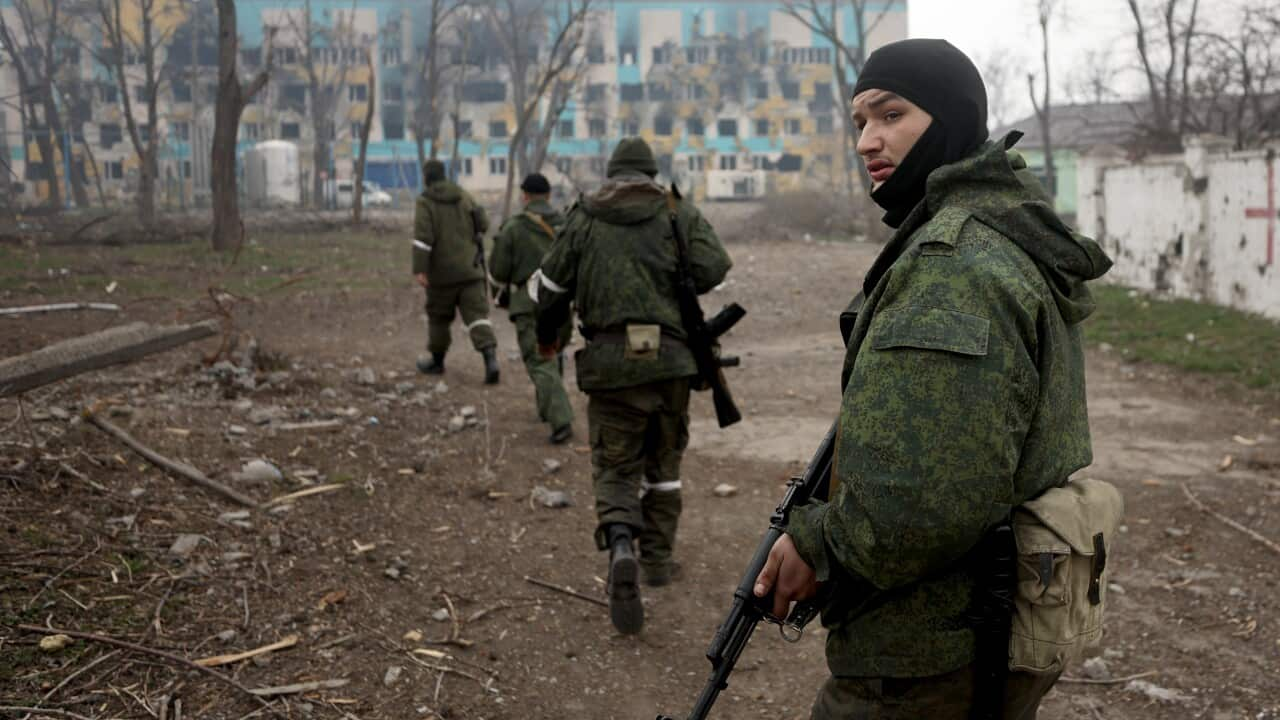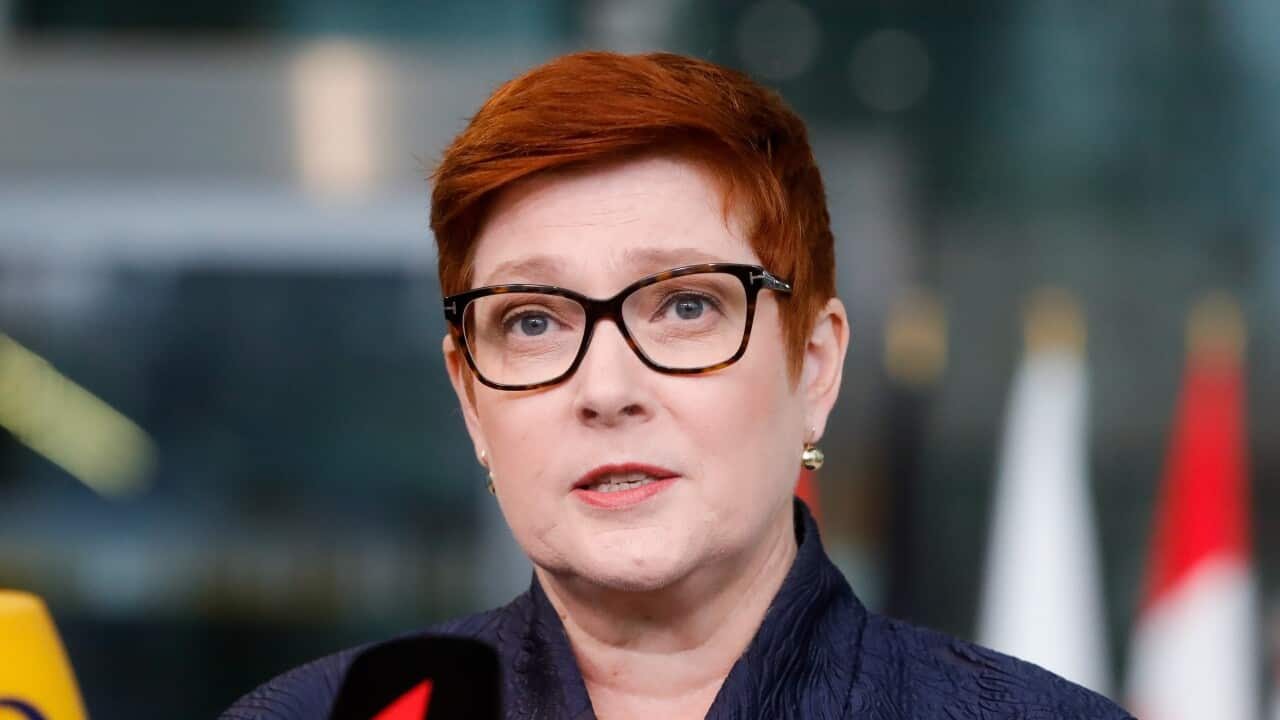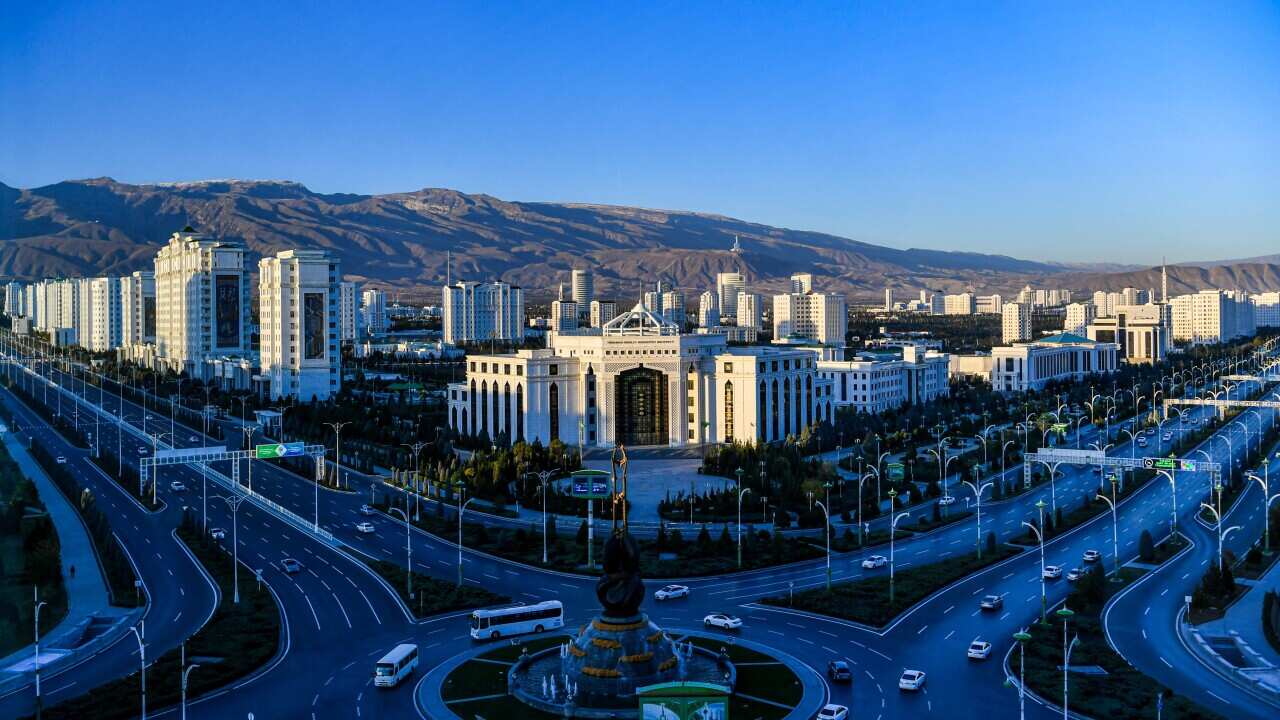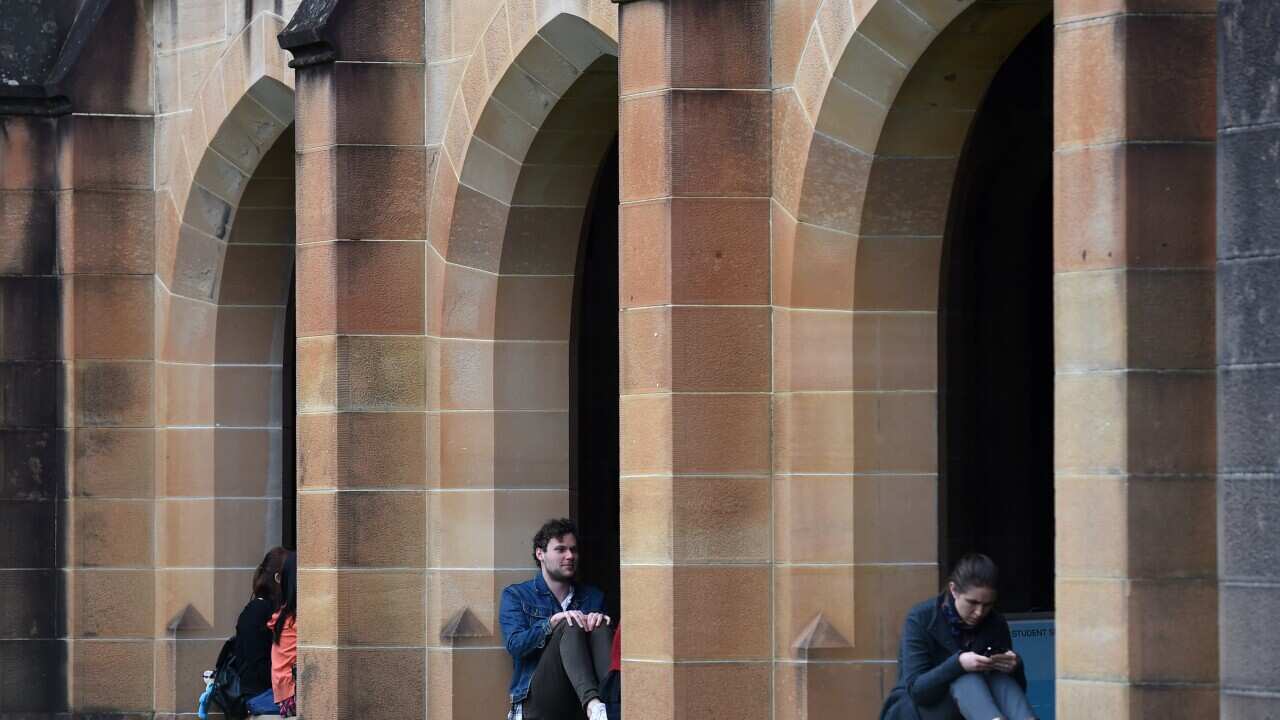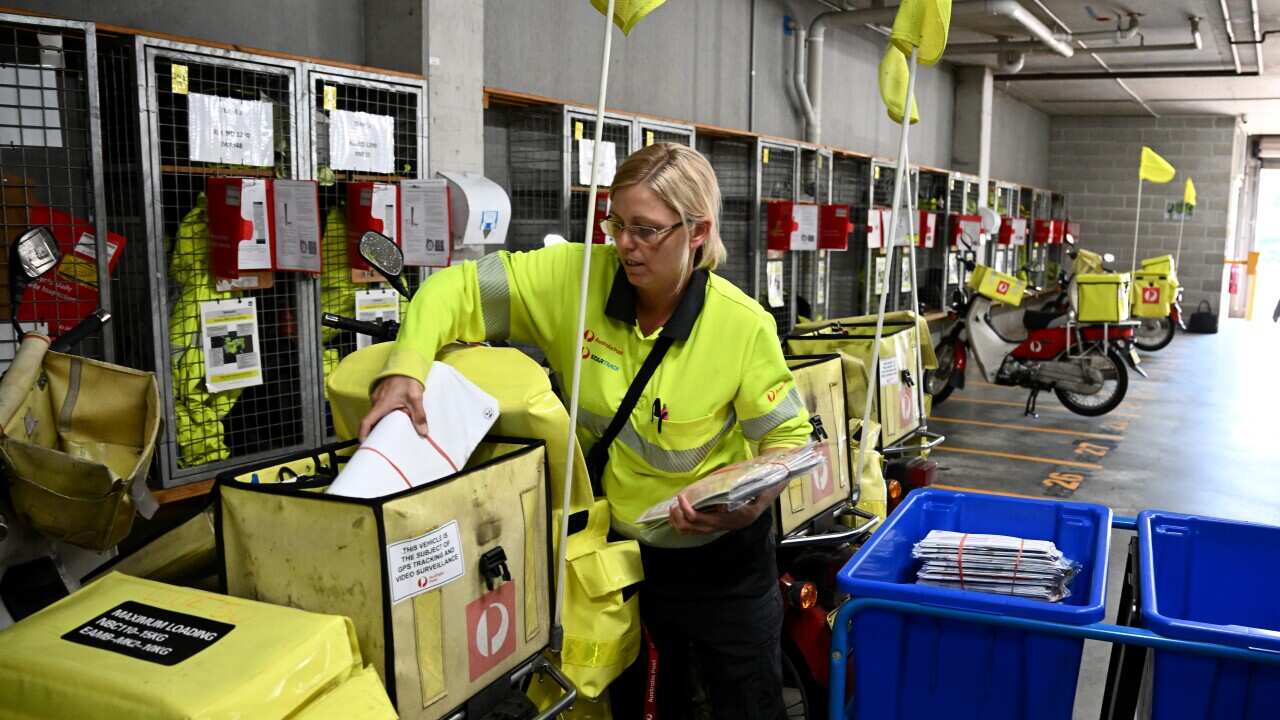Julie Trachuk had only one year left to complete her master's degree in marketing in Kyiv, Ukraine, before Russia invaded.
“It was terrible to see how many people wanted to leave their country,” the 21-year-old says.
Ms Trachuk’s parents put her on the last train to Warsaw, Poland, while her aunt and cousin in Melbourne arranged for her to then flee to Australia.
Three weeks on, she is still coming to terms with how quickly her life has changed. While on a tourist visa, she is unable to study, but she hopes to apply for to continue to do so.

Julia Trachuk with her cousin, Nicola. Source: SBS News / Catalina Florez
Since the invasion of Ukraine began on 24 February, the Australian government has granted more than 6,000 temporary visas to Ukrainian refugees. More than 1,600 of them have arrived.
It’s estimated hundreds of Ukrainian university students are among them - many of them women - prompting a call for action from academics and researchers across the country.
An for undergraduate and postgraduate students who cannot continue their studies in Ukraine due to the war has received almost 140 signatures.
It also calls on universities to extend such offerings to Belarusian and Russian students who “publicly took a stand against the war and, as a result, are no longer able to continue their studies”.
“Thousands of Ukrainian students cannot continue their studies because their cities are being bomb shelled by the Russian military,” the letter states.
“Thousands of people in Russia are protesting against the war every day, and many have been arrested since the start of the conflict. Among them, there are many university students.
“Those young, intelligent and brave people are our hope for a better future.”
Those young, intelligent and brave people are our hope for a better future.Slava Kitaeff
The letter, written by Russian dissident Slava Kitaeff last month, was sent to 18 major universities across the country.
"The academic world needs to stand up and take responsibility for these young people because they are the future,” he said.
How has each university responded?
Australian National University (ANU) and La Trobe University have committed to establishing Ukrainian-specific scholarships, while others are offering support through existing refugee scholarship programs.
An ANU spokesperson said it has a scholarship program in place for students from Ukraine for semester two this year.
“We are also in the process of setting up a visiting program for Ukraine academics and scholars who are able to travel to Australia and who want to work with ANU,” they said.
ANU has also suspended all institutional level ties with Russian universities in response to the invasion.
“Our decision may not be much, indeed it seems tragically insufficient, but given the dangers of an ever-escalating conflict, it is what we can and should do now,” ANU Vice-Chancellor Professor Brian Smith said in a statement last week.
A La Trobe University spokesperson said it is in the process of establishing a research scholarship offering full tuition to displaced Ukrainian students.
“Any undergraduate or postgraduate student on a humanitarian visa, or any international student experiencing hardship, is also eligible to apply for financial support through the university,” they said.
“La Trobe also has a wide range of scholarships and bursaries available to students for which humanitarian visa holders, and those experiencing financial hardship, are given priority consideration.”
Through its membership with the Scholars at Risk Network, the University of Sydney says it is offering a scholarship with funding for two to three places for PhD students from Ukrainian universities to continue their studies. That includes financial support to a student for up to 12 months.
“Undergraduate and postgraduate students who hold a permanent humanitarian visa are eligible to apply for our range of equity scholarships,” a spokesperson said.
“For our current students who are Ukrainian citizens and others we know are affected, we are also offering a range of support including wellbeing support, streamlined special considerations procedures, bursaries, reduced study loads, 1:1 Zoom calls with peer support advisors and any other advice as needed.”
It says it currently does not have any formal institutional partnerships with Russian universities beyond that with the global business schools alliance CEMS and the Association of Pacific Rim Universities (APRU).
The University of NSW (UNSW Sydney) has increased its number of scholarship places offered to asylum seekers or refugees to four.
“With the rapidly escalating refugee crisis – exacerbated by the conflict in Ukraine – these scholarships are more important than ever,” a spokesperson said.
They said UNSW has had “relatively few” formal research collaborations with Russia but is “reviewing the situation to consider any active arrangements”.
The University of Newcastle said it offers two scholarship programs to refugees and asylum seekers, which are open to victims of the war in Ukraine.
“We have also reached out to our current Ukrainian and Russian students to offer support and ensure their welfare,” a spokesperson said.
A Macquarie University spokesperson said it provides a range of support to asylum seekers and refugees, including Ukrainian students.
“We have provided currently enrolled Ukrainian students with wellbeing and financial support including payment plans and deferral of fees options, grants and loans. We are also in the process of developing a dedicated HDR scholarship scheme for qualified Ukrainian applicants,” a spokesperson said.
Macquarie University has no formal research project agreements in place with Russian universities, and has chosen not to pursue activities under two student exchange agreements since the invasion began.
A spokesperson from the University of Queensland (UQ) said the university offers up to 10 scholarships for students from refugee or asylum seeker backgrounds.
They said a number of research papers are published each year with Russian academics through individual researcher engagements.
“While we cannot definitively say these have not been affected, we are not aware of any,” they said.
The University of Canberra’s Vice-Chancellor Professor Paddy Nixon said it has scholarships set aside for any students who come from a hardship or refugee background, which “while not directly allocated to Ukrainian students, are assessed and prioritised on a case-by-case basis”.
“The University of Canberra does not have any formal arrangements with Russian institutions,” he said.
The University of Wollongong (UOW) said all Ukrainian students who receive an offer to study this year will have the international student bursary applied automatically, which gives them a 20 per cent tuition fee reduction.
A spokesperson said a humanitarian assistance program to support students who are impacted globally by humanitarian disasters will be launched in September this year.
“The University of Wollongong has no current research agreements with Russian institutions and no research grants involving Russian institutions,” they said.
While RMIT University in Melbourne has no current plans for a new scholarship program, its international bursary program can be used to help students impacted by events in Ukraine.
“We are actively reaching out to members of our community who are impacted by the crisis in Ukraine to ensure they get the support they need,” a spokesperson said.
“We will continue to connect with students who we know may need assistance or whose circumstances change."
RMIT has no research nor other collaborations with Russian universities.
University of Melbourne Deputy Vice-Chancellor Professor Michael Wesley said the university is offering support services to any students and staff affected by the conflict.
“The attacks are impacting Ukrainians and Russians around the world, including citizens of both countries who work and study at the University of Melbourne. We have been contacting our colleagues and students to offer our support, and we will continue to do so in the coming days,” he said.
A Curtin University spokesperson said it “has a long history of supporting students displaced from their homeland, such as the Ukrainian students arriving in Australia” through its Humanitarian Fund Scholarship which supports undergraduate and postgraduate students from refugee backgrounds.
The university is actively considering how to best assist Ukrainian and international students displaced from Ukraine “with higher degree research opportunities in Australia to support the completion of their degrees,” the spokesperson said.
A Swinburne University spokesperson said it does not have any formal arrangements with either Russia or Ukraine.
“As such, it was not necessary for the university to establish an institution-wide response to the war in Ukraine,” they said.
Monash University, the University of Adelaide, the University of Technology Sydney, the University of Western Australia and Deakin University were also contacted for comment.
Do you know more about this story or would you like to share your story with SBS News? Email

